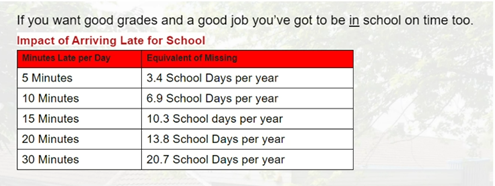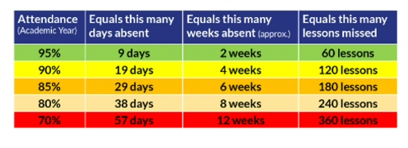Attendance and Punctuality
To support your child’s education and ensure their safety, please take note of the following procedures regarding attendance and punctuality:
Daily Registration
The school register is taken twice daily: at 8:45am and 1:00pm.
Please ensure your child arrives at school before 8:45am each day to avoid receiving a late mark.
Reporting Absences
If your child is absent, please telephone the school office by 9:00am on the day of absence to report non-attendance.
You may leave a message on the school answerphone by calling 01952 386870. If we have not heard from you by this time, we will attempt to contact you to confirm your child’s whereabouts. This procedure is in place to ensure the safety of all children.
Is my child too ill for school?
Everyone must make every effort to attend school every day. However we accept that some children may become ill or have other genuine reasons for absence. When your child is unwell, it can be hard deciding whether to keep them off school. These simple guidelines should help. Not every illness needs to keep your child from school. Use common sense when deciding whether or not your child is too ill to attend school. Ask yourself the following questions.
- Is my child well enough to do the activities of the school day?
- Does my child have a condition that could be passed on to other children or school staff?
- Would I take a day off work if I had this condition?
Common conditions
If your child is ill, it’s likely to be due to one of a few minor health conditions.
Whether you send your child to school will depend on how severe you think the illness is. Use this guidance to help you make that judgement.
Remember: if you’re concerned about your child’s health, consult a health professional.
- Cough and cold. A child with a minor cough or cold may attend school. If the cold is accompanied by a raised temperature, shivers or drowsiness, the child should stay off school, visit the GP and return to school 24 hours after they start to feel better. If your child has a more severe and long-lasting cough, consult your GP.
- Raised temperature. If your child has a raised temperature, they shouldn’t attend school. They can return 24 hours after they start to feel better.
- Rash. Skin rashes can be the first sign of many infectious illnesses, such as chickenpox and measles. Children with these conditions shouldn’t attend school. If your child has a rash, check with your GP or practice nurse before sending them to school.
- Headache. A child with a minor headache doesn’t usually need to be kept off school. If the headache is more severe or is accompanied by other symptoms, such as raised temperature or drowsiness, then keep the child off school and consult your GP.
- Vomiting and diarrhoea. Children with diarrhoea and/or vomiting should definitely be kept off school until 48 hours after their symptoms have gone. Most cases of diarrhoea and vomiting in children get better without treatment, but if symptoms persist, consult your GP.
- Sore throat. A sore throat alone doesn’t have to keep a child from school. But if it’s accompanied by a high temperature, your child should stay at home.
- Chickenpox. If your child has chickenpox, keep them off school until all their spots have crusted over.

Late for School
If you arrive after 8.45am the gate will be shut and you will need to ring the bell to access the office where your child will be signed in. This will mean a late mark in the register. Arrival after 9.15am is marked as an absence for that session.

Appointments During School Hours
Wherever possible, please arrange appointments outside of school hours. If this is not feasible, we ask that appointments be scheduled near the beginning or end of the school day, allowing your child to attend school before or after the appointment.
Please telephone the office in advance to inform us of any appointments, and bring evidence of the appointment when collecting or dropping off your child

How can we help?
We monitor our attendance regularly. If we have concerns around your child's attendance then we will make contact with you through a letter or a phone call. Although 90% in an exam is a good score, 90% attendance is a poor score. In fact the government class 90% and below as persistent absence. We hope to talk to you before your child reaches this level so that we can work with you as necessary and support your child's success in school. This chart can help you to understand your child's current rate of attendance.

- Click here to read the School Attendance Policy
- Click here to read the attendance leaflet for EYFS/Reception children
Leave of Absence Requests
Leave of absence during term time, including holidays, will not be authorised unless there are exceptional circumstances. If you are thinking of taking your child out of school during term time, please read this guidance from Telford and Wrekin Council: T&W leaflet October 2025. If you wish to request an authorised absence, please complete and return the Leave of Absence Request Form at least 20 school working days in advance.
Attendance Records
A record of authorised and unauthorised absences will be included with your child’s annual written report in July.
